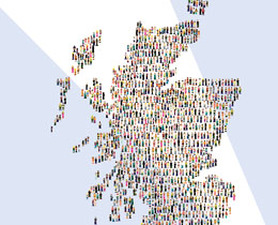
The big question then is how do we live together and organise society to reflect the kind of society we now live in.
In 2011 The Scottish Government produced a document on the same topic. Called Belief in Dialogue it accepted that Scotland was a multifaith, diverse, secular society, but one in which all voices were respected and religoius freedom upheld. It was a Good Practice Guide on how people of religious and non- religous people could live together. It will be no surprise that the conclusion was dialogue - seen as the building blocks of a cohesive and tolerant society and there were plenty of examples of how this might unfold. In fact for the last few years there has been an annual dialogue between religious and belief groups which has grown from an initial insecurity and uncertainty to a meeting of friends, respectful of eachother's differences but aware of our mutual commitment to the common good.
The Scottish document didn't look at the structures of society in the way that the Cambridge one has done. That report covered the areas of education, the media, law, dialogue and social action, hoping it might influence future policy making to ensure an ' an environment in which differences enrich society rather than cause anxiety, and in which they contribute to its common good'. Many of the recommendations are already in place in Scotland. for example the recommendation s for a national conversation, launched by leaders of faith communitues, and what they call ethical traditions, about values underlying public life. Ths is important but we have had a head start here in Scotland. On the Scottish Mace, which is on display at every session of Parliament, are the words compassion, integrity, justice and compassion - the values which Donald Dewar, our first First Minister, declared were the ones on which the new Scotland is built. We've talked a lot about them and they are even incorporated into our education curriculum. Perhaps now's the time to think how to make these practical in public life.
I agree with most of the recommendations, none of which are surprising and are ones that have been talked about in dialogue sessions for years. However one of the more controversial recommendations is about faith schools which the Commission thinks are divisive. The criticism leveled against this recommendation is that the commissioners seem ignorant of the reality, certainly in Catholic schools, many of which reflect the multifaith nature of society. In Scotland we have state funded denominational and non-denominational schools and the mix of pupils in non-denominational schools hasn't done away with racist incidents. Many Catholic schools have pupils of different faiths and no faith and are the multifaith society in miniature. One of the things that makes a school religious, is the ethos and this expresses the values of the school which for the most part are inclusive and caring for all. A new development which will come to fruition in the next few years is a shared campus for a new Catholic and Jewish primary school. While each school will have its own ethos there will be plenty of opportunity for interaction and dialogue. Maybe this is what it's all about - recognising, respecting and deepening difference while getting to know and respect one another through dialogue. It will be interesting to see how it develops.
One of the recommendations reflects something I suggested at the evidence gathering and I'm glad to see it included. That was to consider ways to celebrate the secular, multifaith, multibelief nature of society and to reflect this in a meaningful way in national and civic events. At present many of these are Christian and when they are multi-faith there is a tendency for every religion and belief group to give a reading, prayer or refletion so that it's like a holy concert, sometimes but not often inspirational. I would like to see this change but it needs some creativity and perhaps a common expression of those values that we need to talk about. So an interesting report, pinpointing lots still to be done in the world of interfaith relations.


 RSS Feed
RSS Feed
